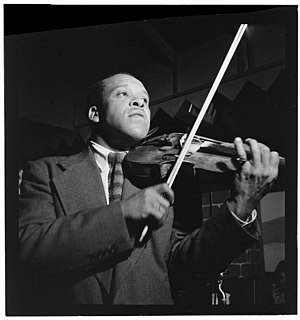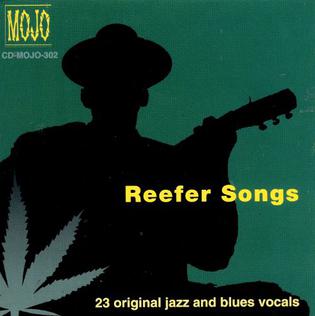Related Research Articles
Jazz rap is a fusion of jazz and hip hop music that developed in the late 1980s and early 1990s. AllMusic writes that the genre "was an attempt to fuse African-American music of the past with a newly dominant form of the present, paying tribute to and reinvigorating the former while expanding the horizons of the latter." The rhythm was rooted in hip hop over which were placed repetitive phrases of jazz instrumentation: trumpet, double bass, etc. Bands involved in the formation of jazz rap included A Tribe Called Quest, Digable Planets, De La Soul, Gang Starr, Jungle Brothers, and Dream Warriors.

UGK was an American hip hop duo from Port Arthur, Texas, formed in 1987, by Chad "Pimp C" Butler and Bernard "Bun B" Freeman. They released their first major-label album Too Hard to Swallow, in 1992, followed by several other albums charting on the Billboard 200 and Top R&B/Hip-Hop Albums charts, including the self-titled Underground Kingz album, which contained their single "International Players Anthem " and debuted at number one on the Billboard 200, in August 2007. The duo has also been featured on hit singles by several other artists, such as "Big Pimpin'" by Jay-Z and "Sippin' on Some Syrup" by Three 6 Mafia. Pimp C founded UGK Records in late 2005. On December 4, 2007, Pimp C died in his West Hollywood, California hotel room.

DJ Jazzy Jeff & the Fresh Prince was an American hip hop duo from West Philadelphia, Pennsylvania. Rapper Will Smith met disc jockey Jeff Townes in the 1980s, when they were both trying to make names for themselves in West Philadelphia's local hip hop scene. They had as a support live member Clarence Holmes – who was not officially credited to the duo. Holmes left the group in 1990 and later sued unsuccessfully for earnings, claiming a breach of oral contract.

Milton Mesirow, better known as Mezz Mezzrow, was an American jazz clarinetist and saxophonist from Chicago, Illinois. He is well known for organizing and financing historic recording sessions with Tommy Ladnier and Sidney Bechet. He also recorded a number of times with Bechet and briefly acted as manager for Louis Armstrong. Mezzrow is equally well remembered as a colorful character, as portrayed in his autobiography, Really the Blues, co-written with Bernard Wolfe and published in 1946.
In African-American culture, Shuckin' and jivin' is joking and acting evasively in the presence of an authoritative figure. Shuckin' and jivin' usually involves clever lies and impromptu storytelling, used to one-up an opponent or avoid punishment. In Ribbin', Jivin', and Playin' the Dozens: The Persistent Dilemma in Our Schools, Herbert L. Foster writes: "Shuckin' and jivin' is a verbal and physical technique some blacks use to avoid difficulty, to accommodate some authority figure, and in the extreme, to save a life or to save oneself from being beaten physically or psychologically."

Hezekiah Leroy Gordon Smith, better known as Stuff Smith, was an American jazz violinist. He is well known for the song "If You're a Viper".

Svend Asmussen was a Danish jazz violinist, known as "The Fiddling Viking". A Swing style virtuoso, he played and recorded with many of the greats of Jazz, including Duke Ellington, Benny Goodman and Stephane Grappelli. He played publicly until 2010 when he had a blood clot, his career having spanned eight decades.
Hip, like cool, does not refer to one specific quality. What is considered hip is continuously changing.

Escape is the second studio album by the hip-hop group Whodini. The album was recorded at Battery Studios in London, where the group worked with producer Larry Smith after their management could not find them a producer. Whodini member Jalil Hutchins convinced Smith, his friend, to produce the album when Smith needed money after a friend's hospitalisation. Although the group originally intended to record more rock-oriented material for the album, its music has a predominantly synthesizer-based backing, with a rhythm and blues influence.

The Toshiko Akiyoshi Jazz Orchestra: Strive for Jive is a live video recording of the Toshiko Akiyoshi Jazz Orchestra featuring Lew Tabackin in a jazz club setting. The video was apparently recorded in the mid 1980s in Chicago and first released on VHS video tape around 1993 and on DVD in 2009.

Hipster or hepcat, as used in the 1940s, referred to aficionados of jazz, in particular bebop, which became popular in the early 1940s. The hipster adopted the lifestyle of the jazz musician, including some or all of the following: dress, slang, use of marijuana and other drugs, relaxed attitude, sarcastic humor, self-imposed poverty, and relaxed sexual mores.

Cannonball in Japan is a live recording by the Cannonball Adderley Quintet at the Sankei Hall in Tokyo which was first released on the Japanese Capitol label in 1966 before being more widely released on CD in 1990.

The Jive Aces are a six-piece UK based, swing band that was formed in 1989. They were the winners of BBC TV's Opportunity Knocks, and Britain's Got Talent semi-finalists in 2012. They have released 11 albums, as well as compilations,EP's and singles and have performed at numerous music festivals.

"If You're a Viper" is a jazz song composed by Stuff Smith. It was first recorded by Smith and his Onyx Club Boys in 1936 and released as the b-side to the song "After You've Gone".
Jive talk, Harlem jive or simply Jive was an African-American Vernacular English slang that developed in Harlem, where "jive" (jazz) was played and was adopted more widely in African-American society, peaking in the 1940s. H. L. Mencken in The American Language defined it as "an amalgam of Negro-slang from Harlem and the argots of drug addicts and the pettier sort of criminals, with occasional additions from the Broadway gossip columns and the high school campus". The word appeared in Cab Calloway's Hepster's Dictionary: Language of Jive (1939), the first dictionary published by a black person, and Dan Burley's Original Handbook of Harlem Jive, which was compiled and published in 1944 at the suggestion of Harlem poet Langston Hughes.
"Jump, Jive an' Wail" is a 1956 jazz swing song by Louis Prima. It first appeared on his album The Wildest! and became one of his signature songs. Keely Smith, Prima's wife at that time, was one of the backup singers on the song.

Reefer Songs is a 1989 compilation album of jazz songs about drugs from the 1920s, 1930s, and 1940s. It features notable artists and musicians of the period, including Ella Fitzgerald, Chick Webb, Cab Calloway, Sidney Bechet and Benny Goodman. Although jive / cannabis is the main drug cited here, cocaine, benzedrine (amphetamine) and heroin are also mentioned.

Terms related to cannabis include:
References
- 1 2 3 Burke, Patrick. Come In and Hear the Truth: Jazz and Race on 52nd Street. University of Chicago Press. p 245. Accessed 4 July 2017
- ↑ Catalog of Copyright Entries: Third series. Volume 17. Part 5. Number 2. 1964: Library of Congress. p 1876. Accessed 4 July 2017
- ↑ Décharné, Max (2017). Vulgar Tongues: An Alternative History of English Slang. Penguin. p. 114. ISBN 9781681775005.